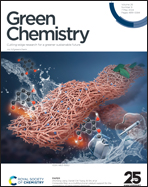Production of lignin containing cellulose nanofibrils (CNF) after enzymatic treatment of curl-induced, unbleached kraft pulps†
Abstract
Lignin-containing cellulose nanofibrils are successfully produced after enzymatic treatment of curl-induced, unbleached kraft pulps. An enzyme cocktail composed predominantly of endoglucases but also containing xylanases, laccases, and lytic polysaccharide monooxygenases (LPMO's) results in significant enzyme-mediated fiber modification. A substantial (70%) reduction in pulp viscosity can be achieved while enzyme treatment of curl-induced fibers results in improved fibrillation and increased colloidal stability. This is likely due to the higher negative charge density (−57.5 mV) of the fibers. The enzyme-treated, curl-derived cellulose nanofibrils show improved characteristics such as higher transmittance, lower viscosity, and thinner nanofibrils, resulting in enhanced nano-fibrillation. Superior mechanical properties, such as increasing the tensile strength of cellulose nanopapers to 150 MPa, are obtained as a result of the improved fibril network. The pre-curled fibers appear more accessible to enzyme treatment, resulting in cellulose nanofibrils with improved properties with less chemical treatments and mechanical refining energy required.

- This article is part of the themed collection: Biomass Conversion in Green Chemistry: Key Highlights


 Please wait while we load your content...
Please wait while we load your content...